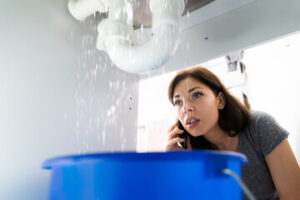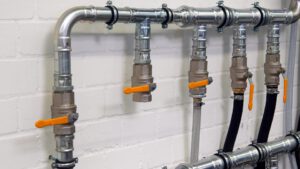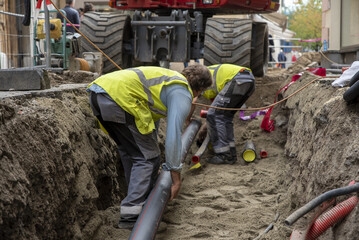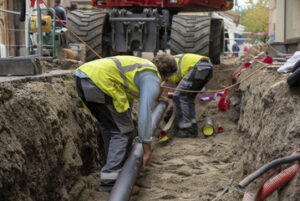Plumbers are professionals who work on a variety of plumbing issues. They often use specialized tools that aren’t available at your local DIY store.
Having a well-functioning plumbing system is important in terms of home safety and upholding property value. Click here at https://hubbardmechanical.com/ for professionals with extensive experience and training to perform repairs that last.
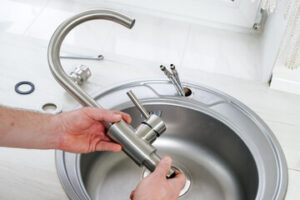
Expertise
Plumbing is a highly specialized field and it’s not something that can be easily done by anyone with a screwdriver. Professional plumbers have extensive training and the knowledge to accurately diagnose problems and offer permanent solutions. They are also familiar with the local regulations and codes that govern plumbing work in your area. Trying to fix your plumbing issues without proper training and knowledge can lead to further damage and cost you more money in the long run.
When it comes to plumbing, a small leak or clogged drain can turn into an emergency if not dealt with immediately. This can cause flooding, water damage, and even health problems. Fortunately, professional plumbers are trained to deal with these emergencies and can help you restore your home quickly. They will also be able to provide you with advice on how to prevent future problems.
In addition to their expertise, plumbers have access to a wide range of tools and equipment that you may not have at home. These include high-powered drain cleaners and special cameras for inspections. These tools can save you a lot of time and hassle by getting the job done more efficiently. In addition, plumbing services can also offer you regular maintenance to keep your plumbing system in good condition.
One of the most important reasons to avail professional plumbing services is their reliability. A reputable plumbing service will be available to you at all times, day and night. They will also come to your home or business on time and will be able to solve the problem quickly and effectively. They will also provide you with a warranty on their work, so you can rest assured knowing that your plumbing is in good hands.
Many people try to do DIY plumbing jobs, such as fixing a toilet or unblocking a drain. However, it’s best to leave these tasks to professionals. One wrong move could lead to serious damage and cost you a lot of money. Moreover, it’s not always easy to figure out what the problem is, so you might end up spending more on repair costs in the long run.
Safety
While plumbing may not make the list of more dangerous trades, it still comes with its own set of risks. Every plumbing job poses the risk of injury, especially if safety protocols are not followed. It’s important that your plumber is aware of these risks and takes the necessary precautions to protect themselves and their clients.
This includes wearing protective clothing and using the proper tools for each job. For example, if a plumber needs to enter a confined space where oxygen levels are low, they should wear a respirator. They should also use a face mask to prevent inhaling harmful dust particles. In addition, plumbers must use work gloves to protect their hands from chemicals or other substances they come into contact with during plumbing repairs and installations.
Another important factor to consider is the quality of plumbing equipment. Licensed plumbers use professional supplies, which are typically of higher quality and longer lasting than those sold in big box stores. In addition, some professional plumbing services require special equipment that can only be purchased through a professional supply warehouse.
In addition, licensed plumbers follow local building and plumbing codes to ensure that the job is done correctly and safely. This helps to avoid future problems and deliver a high-quality customer experience.
Professional plumbing services can also increase the value of a home or commercial property. A well-maintained plumbing system is a key component of a home or business, and proper maintenance can reduce the need for costly repairs in the future.
Time
Professional plumbing services are a valuable investment that can save your business time and money in the long run. From cleaning drains and clogged pipes to fixing leaky faucets and water heaters, they can handle all of your plumbing needs quickly and efficiently. In addition, they can help you prevent costly repairs by performing regular maintenance and inspections.
If you are considering hiring a plumbing service, it is important to find one that is licensed and insured. This will ensure that they have the proper training and experience to work safely and effectively in your home or business. In addition, a licensed plumber will be familiar with local codes and regulations, which can minimize the risk of damage or complications.
Licensed plumbers also have access to specialized tools and equipment that can be used to perform more complex jobs. This can save you time and money in the long run by reducing the need for costly repairs or replacements. In addition, they can provide you with a range of services, including drain cleaning, leak detection, repair, installation, and inspection.
Leaky faucets, toilets, and fixtures can waste gallons of water and lead to high energy bills. A licensed plumber can assess your plumbing system and make recommendations for upgrades that will improve efficiency and reduce your energy costs.
Plumbing issues can be a major hassle and inconvenience for homeowners. Trying to fix them yourself can result in further damage, expensive repairs, and even health hazards. Hiring a professional plumber can save you time and money by handling the job quickly and correctly the first time.
When choosing a plumber, it is a good idea to ask friends, family, and colleagues for recommendations. This will help you find a plumber with a reputation for quality work and customer satisfaction. In addition, you can look online for reviews and testimonials. Lastly, it is a good idea to get quotes from several plumbers before making a decision. This will allow you to compare prices, services offered, and customer satisfaction.
Plumbing problems can be a real headache, especially when they occur unexpectedly. However, with the help of a professional plumber, you can avoid these problems and keep your home or office running smoothly.
Money
Plumbing is an essential service for any property. It plays a vital role in the sanitation of a building or home, and it can be complicated to deal with if there are any issues. Professional plumbing services offer a wide range of services that are designed to address any issue with your home or office’s plumbing. They are available for routine maintenance, emergency repairs, and new construction projects.
A professional plumber can solve any plumbing problem quickly and efficiently, saving you time and money. They can also save you money on energy bills by fixing leaks and clogs. Plumbing services can also help you avoid costly repairs by conducting regular inspections and preventive maintenance.
Local plumbers understand the unique plumbing challenges of their region, which can be due to climate, soil conditions, or even choices made during construction. They are more likely to have experience working with pipes of similar materials and are familiar with local code requirements. This knowledge makes them a better choice than an out-of-town plumber who may not be familiar with the area’s plumbing challenges.
Licensed professionals use specialized tools and equipment to perform their jobs more effectively and safely. They are also more likely to carry liability insurance, which protects you in case of any damage or accidents during the work.
Many homeowners try to fix plumbing problems on their own, but this can be dangerous and lead to further damage. It is best to leave plumbing problems to the professionals, who have the tools and training necessary to handle any situation. They can also provide you with advice on how to minimize future problems, such as by installing water-saving fixtures or replacing old pipes.
A well-maintained plumbing system can increase the value of your home or business. It can also make it more attractive to potential buyers. Professional plumbing companies can install or upgrade your plumbing system and fixtures, ensuring that they are up-to-date and functioning properly. They can also recommend energy-efficient upgrades that will save you money in the long run. They can also help you reduce your carbon footprint by advising on the use of eco-friendly fixtures and appliances.
